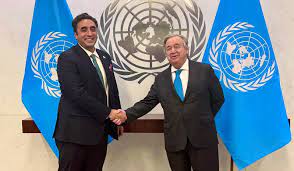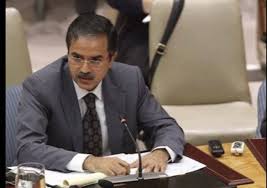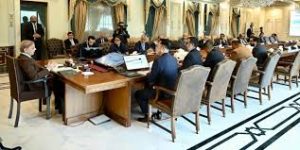Bilawal Bhutto lauds UN development system’s role in helping flood-hit Pakistan’s recovery

United Nations: Foreign Minister Bilawal Bhutto Zardari has praised the United Nations development system, especially its Resident Coordinator’s office in Islamabad, for their crucial role in supporting Pakistan’s national efforts to respond and recover from the “dire situation” left behind by last August’s devastating floods.
“The Resident Coordinator’s Office was our go-to place for coordinating UN response to catastrophic floods,” he said in a video message to a roundtable discussion held at UN Headquarters in New York on the case study regarding the “coordinated and comprehensive response to Pakistan’s floods in 2022?.
The foreign minister said the Resident Coordinator’s role “significantly streamlined” coordination effort for the Government, and ensured smooth exchange of information among all partners on the country’s emergency situation.
He expressed his appreciation to the Resident Coordinator, Julien Harneis, and his able team for helping Pakistan to launch the flash appeal in a timely manner, and UN Secretary-General Antonio Guterres for his extraordinary support and his solidarity visit to Pakistan, in the wake of the floods.
“The Resident Coordinator played a central role in closely coordinating the organization of the international relief and recovery assistance, especially through timely communications with the federal and provincial departments, multilateral agencies, and bilateral donors,” FM Bilawal said.
That ensured timely identification of relief needs and the sources and modalities to meet these needs, and the coordination helped save precious lives and respond to humanitarian needs of the affectees, he told the meeting.
The Resident Coordinator, FM Bilawal said, also played a critical role in the formulation of Pakistan’s comprehensive recovery plan with the help of a team including the World Bank, Asian Bank, European Union and the UN Development Programme (UNDP) that worked with the relevant Pakistan ministries.
Later, he said, Pakistan, in coordination with its partners from the UN system, formulated the Resilient Recovery, Rehabilitation and Reconstruction Framework (4RF).
“The 4RF provides an overarching framework for planning, financing, implementing and monitoring Pakistan’s recovery efforts,” the foreign minister said.
“The Government’s current focus is to transform these plans into concrete and viable projects for timely and effective implementation.”
In his opening remarks, Pakistan’s UN Ambassador Munir Akram also spotlighted Pakistan’s long-standing and enduring partnership with the UN Development System, saying that “over the last three years, the system has been put to the ultimate ‘stress test’.”
The COVID-19 pandemic has had a particularly devastating impact on the developing countries serviced by the UN development system; with health systems stretched and shattered; lives and livelihoods devastated; revenues eviscerated; large debt liabilities and little fiscal space to recover from the pandemic and keep their economies afloat.
“The climate catastrophe is simply the coup de grace atop these challenges,” the Pakistani envoy said.
But even as developing countries struggled, Ambassador Akram said, the UN development system responded with alacrity and coherence to the crises.
“During the pandemic, and even in the context of the floods in Pakistan, we have seen that assessments of the country’s needs are quickly prepared, enabling the Secretary-General to launch his appeals for emergency help in a timely manner.”
Undoubtedly, he said, the Resident Coordinator system has contributed to making the UN development system more coherent, impactful and efficient.
The UN Resident Coordinator in Islamabad, Harneis, also spoke as did representatives of member states and expressed their views about the UN development system.
The event was moderated by the Development Coordination office (DCO) Director, Assistant Secretary General Fernandez-Taranco.





